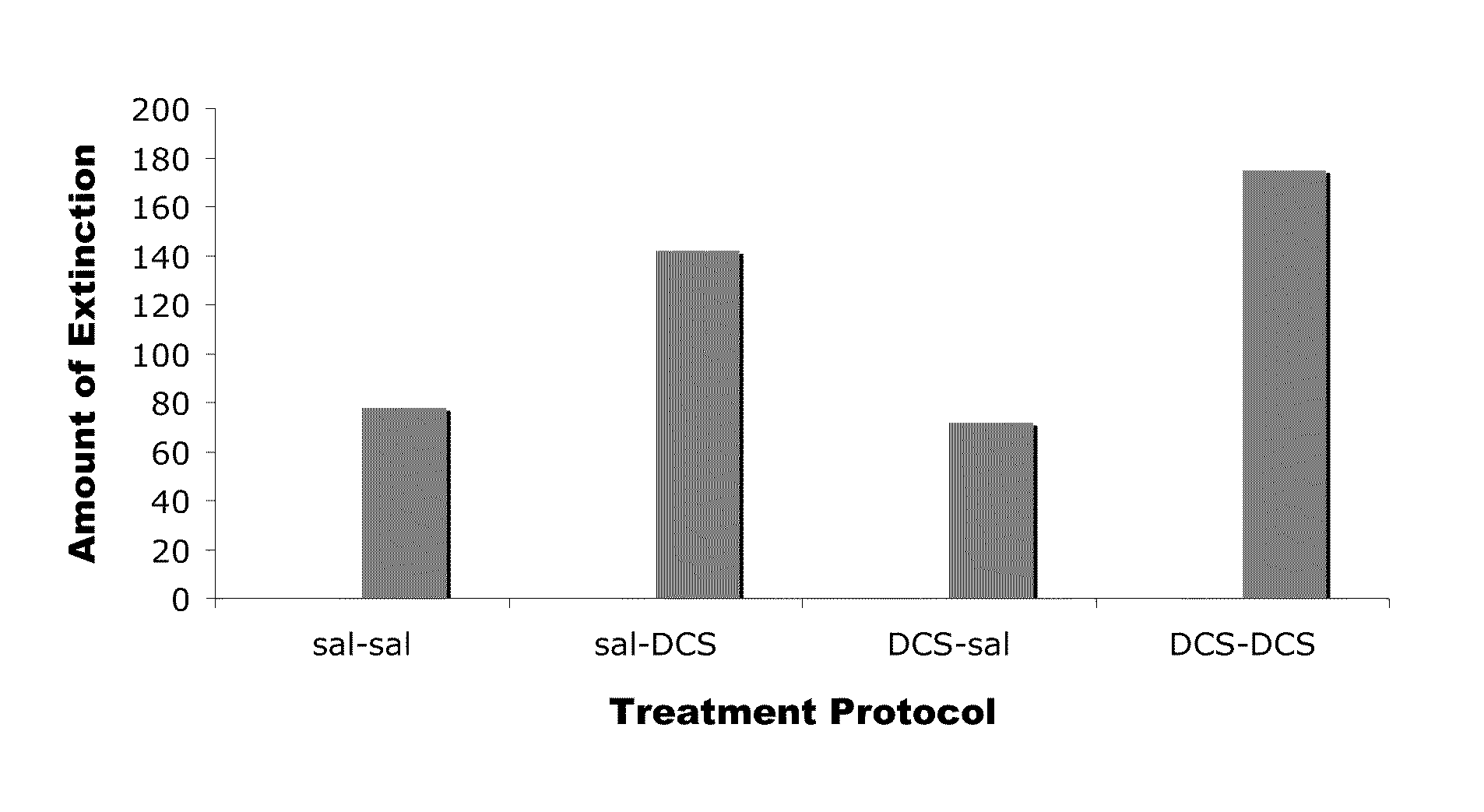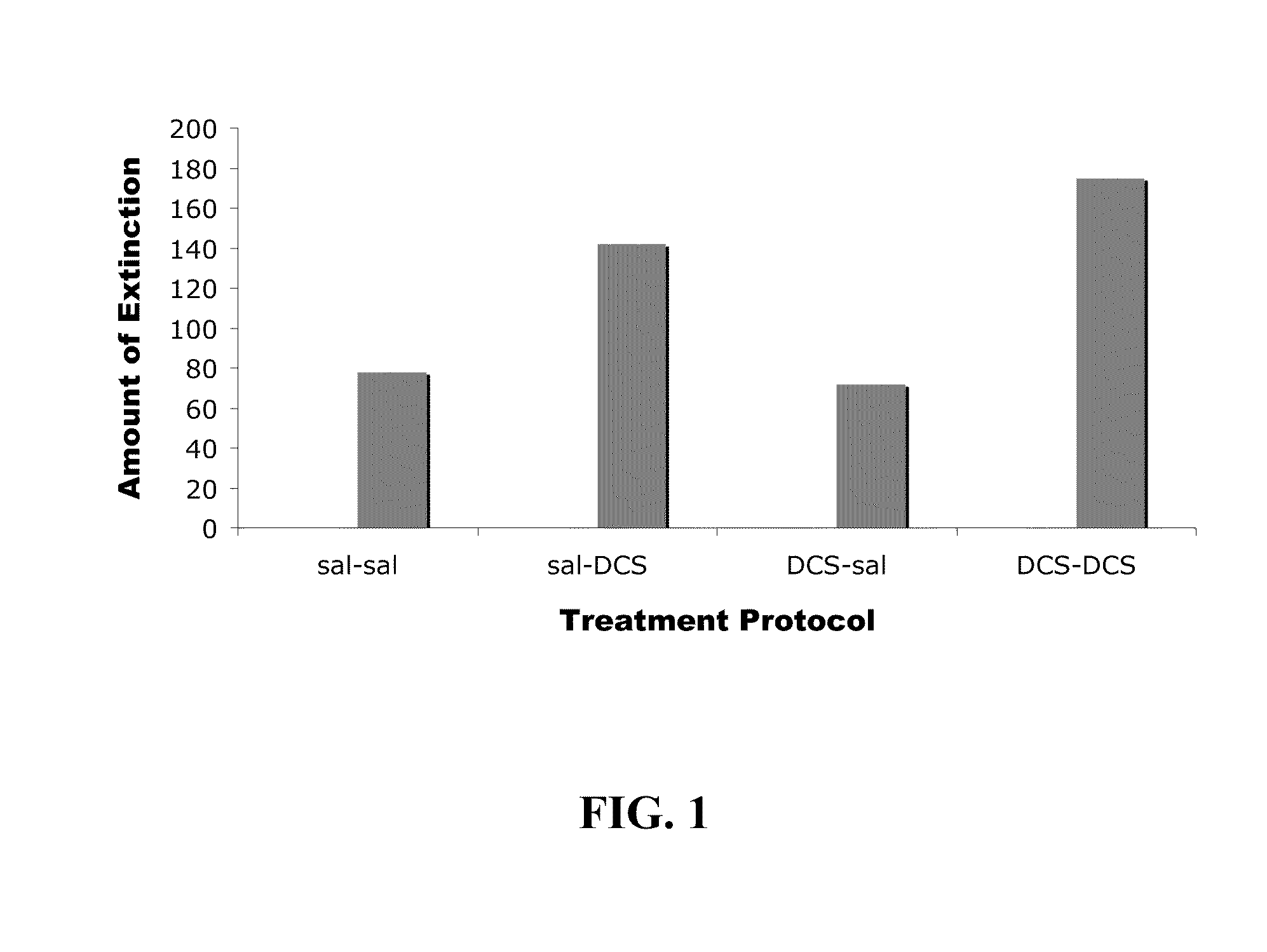Method for Facilitating Extinction Training Using D-Cycloserine
a technology of d-cycloserine and extinction training, which is applied in the direction of heterocyclic compound active ingredients, biocide, drug compositions, etc., can solve the problems that dcs cannot provide, and the practice may not reap all the benefits, so as to facilitate extinction training, facilitate consolidation of learning, and improve the effect of therapeutic outcomes
- Summary
- Abstract
- Description
- Claims
- Application Information
AI Technical Summary
Benefits of technology
Problems solved by technology
Method used
Image
Examples
example 1
Effect of Post-Training Pre-Sleep Administration of DCS on Rats
[0088]Subjects. Twenty male, Sprague Dawley rats (300-350 grams) were used. Rats were placed in cages used to measure the acoustic startle reflex (see, e.g., Cassella, J. V., and Davis, M. “The design and calibration of a startle measurement system”, Physiology and Behavior (1986), 36, pp. 377-383) and, after a 5-min acclimation period, presented with 50 startle stimuli (50-ms duration, 5-ms rise-decay time), 10 at each of five intensities (95, 100, 105, 110, and 115 dB) in a semi-random order at a 30-s interstimulus interval. The animals were subsequently divided into four groups of 5 rats each having similar mean startle amplitudes across the 10 stimuli at each intensity.
[0089]Fear conditioning and testing. On two consecutive training days, animals were placed in the startle chambers and after a 5-min acclimation period, presented with 10 light shock pairings. The shock was presented during the last 500 ms of the 3,700...
example 2
Effect of Post-Training Pre-Sleep Administration of DCS on Rats
[0093]Subjects. Twenty male, Sprague Dawley rats (300-350 grams) were used. Rats were placed in cages used to measure the acoustic startle reflex (see, e.g., Cassella, J. V., and Davis, M. “The design and calibration of a startle measurement system”, Physiology and Behavior (1986), 36, pp. 377-383) and, after a 5-min acclimation period, presented with 50 startle stimuli (50-ms duration, 5-ms rise-decay time), 10 at each of five intensities (95, 100, 105, 110, and 115 dB) in a semi-random order at a 30-s interstimulus interval. The animals were subsequently divided into four groups of 5 rats each having similar mean startle amplitudes across the 10 stimuli at each intensity.
[0094]Fear conditioning and testing. On two consecutive training days, animals were placed in the startle chambers and after a 5-min acclimation period, presented with 10 light shock pairings. The shock was presented during the last 500 ms of the 3,700...
PUM
| Property | Measurement | Unit |
|---|---|---|
| time | aaaaa | aaaaa |
| time | aaaaa | aaaaa |
| time | aaaaa | aaaaa |
Abstract
Description
Claims
Application Information
 Login to View More
Login to View More - R&D
- Intellectual Property
- Life Sciences
- Materials
- Tech Scout
- Unparalleled Data Quality
- Higher Quality Content
- 60% Fewer Hallucinations
Browse by: Latest US Patents, China's latest patents, Technical Efficacy Thesaurus, Application Domain, Technology Topic, Popular Technical Reports.
© 2025 PatSnap. All rights reserved.Legal|Privacy policy|Modern Slavery Act Transparency Statement|Sitemap|About US| Contact US: help@patsnap.com


